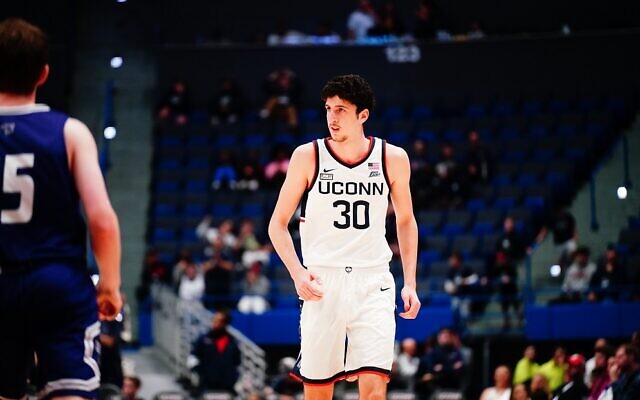UCONN Hoops Boasts Lasting Connection to Israel
The University of Connecticut has maintained an historical connection to Israeli basketball and currently features freshman forward, Yarin Hasson.

It is fairly common knowledge that the University of Connecticut regularly boasts some of the country’s premier men’s and women’s basketball teams. Indeed, Connecticut’s largest state school, whose main campus is nestled in the woodsy village of Storrs, is synonymous with college basketball royalty.
But far lesser known is that on the men’s side, UConn has a strong historical connection to Israeli basketball, having assembled rosters throughout the years that included Doron Sheffer and Nadav Henefeld, both of whom went on to have decorated careers for Maccabi Tel Aviv; Gilad Katz, a backup guard in the early 1990s; and forward, Uri Cohen-Mintz, who played briefly for the school during the 1994-95 season.
And it now appears that the tradition continues as the recently crowned national champion UConn Huskies had yet another Israeli player on their roster, Yarin Hasson, a 6-foot-9 versatile freshman forward who was a high school phenom for Gimnasya Rialit in Rishon Lezion and a member of the U18 Israeli national team, before matriculating at UConn last fall.
While the UConn men’s basketball team understandably had lofty expectations heading into this season, Hasson, a native of Gan Yavne who hadn’t even turned 18 when he became the program’s 12th and final scholarship player last August, most certainly did not. With a lanky 6’9”, 205-pound frame, Hasson was planning on spending an excessive amount of time in the weight room while knowing full well that American college hoops was going to be quite the transition from Israeli high school competition and that playing for one of the country’s premier teams would mean sparse playing time.
By season’s end, Hasson had seen the court for a total of 10 minutes, snagging one offensive rebound and swatting away one shot. He never scored once but did play in the waning seconds of UConn’s first and second round games against Iona and St. Mary’s, respectively.
Had Hasson stayed in Israel for college, he could have continued playing for Maccabi Rishon Lezion, the local club, for whom he surely would have had a more significant role. But he knew Big East basketball would pose a greater challenge and an opportunity to get more wide-reaching exposure, albeit in incremental stages. As such, he has no regrets about his decision last fall to embark on the next chapter of his basketball career stateside.
“For sure, it’s very different here from the basketball in Israel,” Hasson told The Times of Israel as his team was steamrolling its way through March Madness. “All of the money invested in college basketball is very different than in Israel. That’s the reason I came here — to become a better player, to become a great player. And I feel my decision is helping me already.”
For sure, it’s very different here from the basketball in Israel. All of the money invested in college basketball is very different than in Israel. That’s the reason I came here — to become a better player, to become a great player. And I feel my decision is helping me already.
If nothing else, having a courtside seat while cheering along the Huskies as they obliterated the field en route to their fifth national championship—and fourth this century—was worth the 5,000-plus mile journey to a foreign land with an often-inhospitable wintry climate.
“Like I always say to my friends and my family, you can watch it [March Madness] from Israel, on TV or YouTube, but you never understand how huge it is until you come to the U.S. and you see it,” he added. “We watched the tournament from Israel and saw that it’s huge, but we didn’t understand how huge. It’s millions of fans, all the media, all the best players in one place. I can say it’s even bigger than I expected it to be.”
Having just finished his first year of studies at UConn (he’s majoring in business), Hasson is headed back to Israel for a month to catch up with his parents, Malka and Eitan, and younger brothers, Yahav and Shoham, as well as conversing with Israeli officials about a deferral on his required military service. As is often the case with many top-tier Israeli athletes, such as Washington Wizards forward Deni Avdija, who had his military service deferred after being selected in the 2020 NBA Draft, there is a certain expectation that Hasson will have his request met.
But then it’s back to the U.S., where he will be training all summer long in anticipation of having a more substantial role next fall—for a team other than UConn. Alas, on April 17, he made the trendy decision to enter the transfer portal with the intention of landing at another big-time college basketball school, perhaps one where he will get more playing time.
Irrespective of where his collegiate career takes him, Hasson has proudly continued the now decades-long tradition of Israel being well-represented at one of the nation’s most storied college basketball schools, and one that happens to have a vibrant Jewish community, of which he was an actively engaged member.
And for good measure, his participation in UConn’s run to a national title also meant that Judaism was further enmeshed in what was a historic time for sports in the state of Connecticut: Less than a week after the Huskies cut down the nets at the Final Four in Houston, the Quinnipiac University Bobcats men’s ice hockey team, one with Jewish skaters Yaniv Perets, Sam Lipkin, Noah Altman, and T.J. Friedmann, prevailed at the Frozen Four in Tampa to capture the program’s first national title.



comments